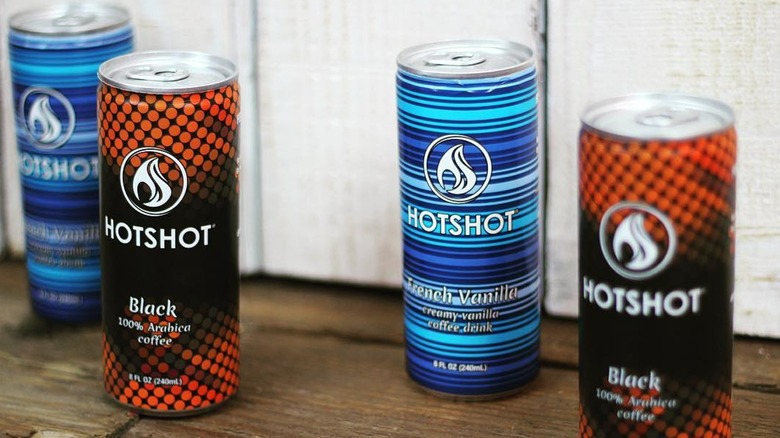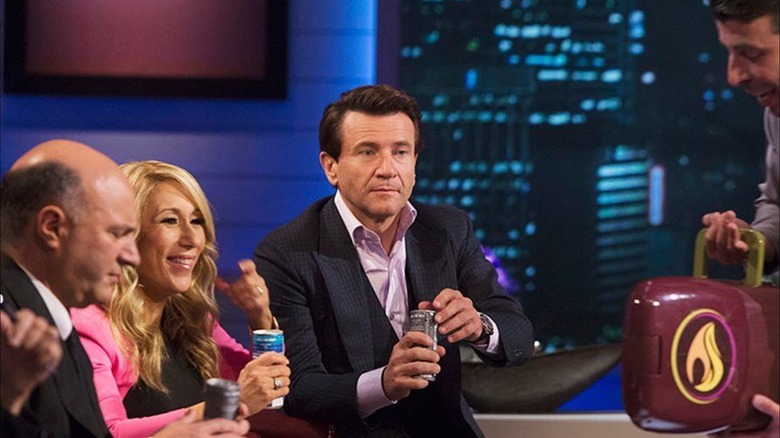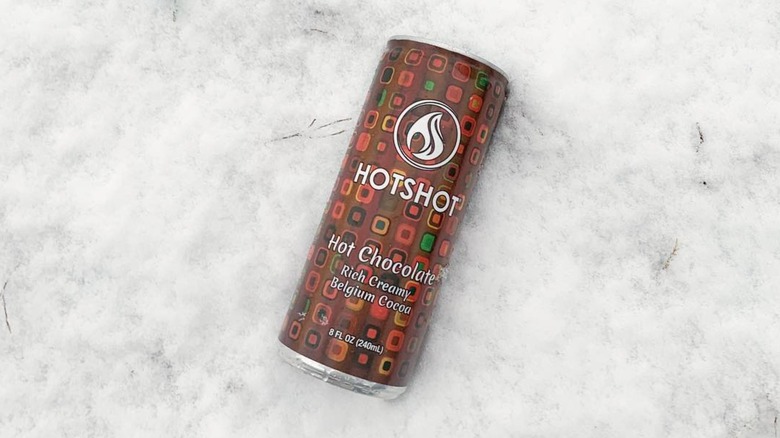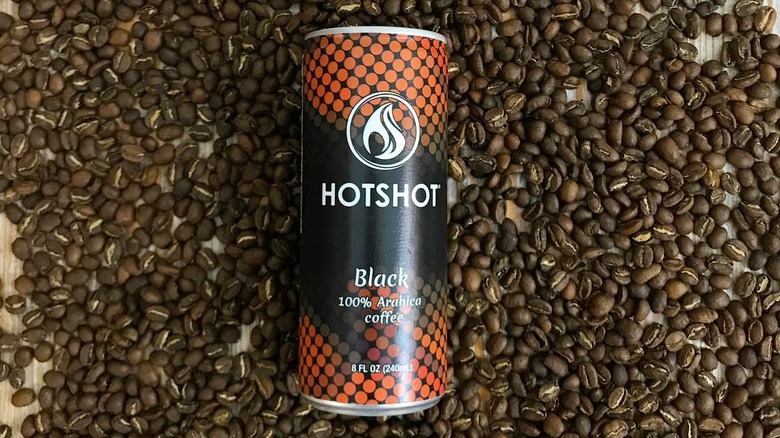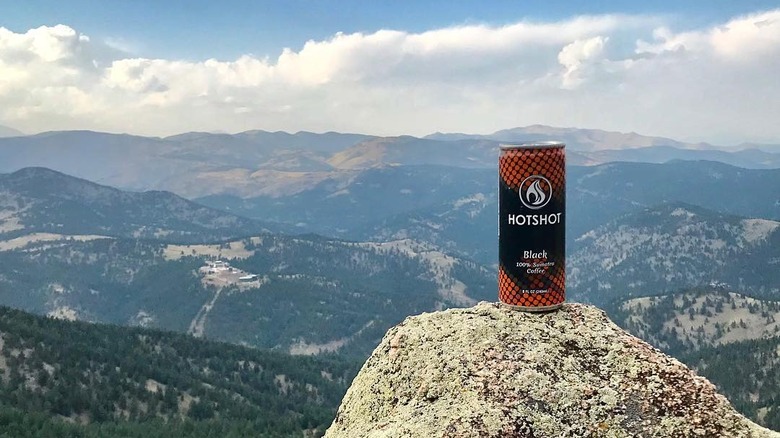HotShot: Here's What Happened After Shark Tank
We may receive a commission on purchases made from links.
When you think of ready-to-drink canned coffee, it's almost always a chilled beverage picked up from a cold refrigerator that comes to mind — perhaps even one of Starbucks' canned oatmilk Frappuccinos. But "Shark Tank" Season 7, Episode 6's HotShot came with a twist: Its canned coffees were hot. Though a fairly novel concept in America at the time, hot canned coffees have been popular in Japan since the early 1970s. And that's precisely where HotShot's founder Danny Grossfeld got the idea.
Grossfeld was on a trip to Japan when jet lag had him hunting down hot coffee at five in the morning. Frustrated at the lack of hot java at the odd hour, Grossfeld settled on what seemed to be an icy canned coffee sitting inside a convenience store's refrigerator. Much to his surprise, the coffee turned out to be hot, and the refrigerators, hot boxes!
Back in the U.S., the entrepreneur pooled together $2 million from friends and family and spent the next six years working on the java. He came up with a formulation that would keep his coffees hot at 140 degrees Fahrenheit for four months in the heated fridges and packed them in 8-ounce cans with an insulated lining. He also developed several flavors, including sweetened espresso, French vanilla, and chocolate. Grossfeld claimed that Japan alone sold $15 billion worth of hot canned coffee the year before filming in 2015, indicating a promising future for HotShot. But would that be enough to convince the Sharks?
What happened to HotShot on Shark Tank
Armed with his hot canned coffees, Grossfeld hoped to convince the Sharks into investing $300,000 in exchange for a 10% stake in HotShot. Though the Sharks liked the taste of the coffees, there were concerns over the company's numbers. Grossfeld had put six years and two million into HotShot but most of that had gone into developing the recipe and testing the canned coffee's ability to stay hot. The company had little to show in terms of sales because HotShot was yet to launch in the market.
Though Grossfeld planned to launch soon and had interest from several businesses including movie theaters, the Sharks remained unconvinced. Kevin O'Leary said that his rule was to give a business no more than 36 months to start making money, and HotShot has passed that timeframe. Lori Greiner agreed as well, advising Grossfeld to reevaluate his business rather than raise more money.
Guest Shark Chris Sacca also backed out since he was an investor in competing business Blue Bottle Coffee (formerly helmed by James Freeman), as did Robert Herjavec. The latter believed that though the concept was popular in Japan, there were plenty of round-the-clock coffee shops in America to render hot canned coffees pointless. Though Mark Cuban had more faith in HotShot and offered to be its customer, he too followed his fellow Sharks. With no sales to back his business idea, Grossfeld ended up walking out of the Tank without any offers.
HotShot after Shark Tank
Grossfeld left the Tank without a deal, but his appearance on the show benefitted the company in other ways. The weeks leading up to HotShot's air date gave the company enough publicity to generate interest amongst private investors off-screen. The outside investment put HotShot back on track, and the company officially launched on November 2, 2015.
Viewers could pre-order starter kits priced at $69.99 that came with the company's Hotbox (the hot fridge that would keep the cans warm) and 12-pack of cans. After that, replacements could be bought for $26.99 per dozen cans. Shoppers could also choose from four variants: espresso, caramel, vanilla frappe, and a non-caffeinated hot chocolate drink.
The nationwide exposure from "Shark Tank" ensured that HotShot coffee got off to a great start. Grossfeld told PR Newswire that, "initial response to the segment has been phenomenal ... phone and web pre-orders are streaming in and in two days since the show aired, I have received more orders than in 45 days on Kickstarter."
By 2017, HotShot had narrowed its selection to a total of three drinks — hot chocolate, French vanilla-flavored coffee, and black coffee — that were sold online in packs of 12 for $35. The price of starter kits too had been upped to $99.99. Hot fridges could be bought separately for $79.99, and customers could sign up for subscriptions to keep the boxes stocked. A year later, HotShot had also made its way onto Amazon.
Is HotShot still in business?
Despite the initial success, HotShot no longer seems to be in business. The company's website is down, its Instagram account has been dormant since January 2019, and the canned coffees are marked as unavailable on Amazon.
HotShot's lack of activity comes at the back of years of success. Though Mark Cuban (who is officially leaving "Shark Tank") refused to make a deal in the Tank, he had offered to test the canned coffees at one of his Landmark Theaters and at the American Airlines Stadium — home of the Cuban-owned Dallas Mavericks. Although it's unclear whether Cuban followed through with his offer after the show, Grossfeld did find customers elsewhere.
Regal, AMC, and Cinemark gave HotShot a trial run at their theaters in 2016, as did Malco Theatres, who agreed to put the coffees in 35 outposts if the initial tests were successful. The hot canned javas were also offered at Cirque du Soleil shows, Walt Disney World's Swan and Dolphin Resort, and New York's Madison Square Garden. The coffees made their way to Texas-based liquor chain Spec's and were being tested at Bed, Bath & Beyond with potential for a national partnership.
HotShot also made a deal with the independent wholesaler S.K.I. Beverage, which would put the coffees in 12,000 outposts across Manhattan and Long Island among other East Coast locations. But by the looks of it, HotShot's future ended with the trial runs because the company never quite took off after.
What's next for HotShot's founder?
There's no official news on when or why HotShot went out of business, or whether it's a permanent move or a temporary hiatus. While O'Leary and Greiner had advised Grossfeld to consider cutting his losses in the Tank, the entrepreneur powered through and launched his company with plenty of businesses interested in testing his hot canned coffees. But whether it was the lack of sales that never transformed the trials into permanent partnerships or other troubles that plagued the company remains to be seen.
According to Grossfeld's LinkedIn page, however, the founder is still the President of HotShot. What's also certain is that the company was planning to expand even further. New canned javas such as hot cappuccinos were in the works, as were other drinks like apple cider, green tea, and a banana-flavored protein shake. If that's anything to go by, fans could speculate that it might not be the end of the road for HotShot. After all, Grossfeld himself has never been short of patience and resilience — he did spend more than half a decade working on his hot canned coffees before they launched. Could he still be working on HotShot to relaunch it once again in the future? Fans can only hope!
"Shark Tank" is available to purchase on Prime Video.

